- My So-Called Life (Pi... - #1 »
- Dancing in the Dark - #2 »
- Guns and Gossip - #3 »
- Father Figures - #4 »
- The Zit - #5 »
- The Substitute - #6 »
- Why Jordan Can't Read - #7 »
- Strangers in the Hous... - #8 »
- Halloween - #9 »
- Other People's Daught... - #10 »
- Life of Brian - #11 »
- Self-Esteem - #12 »
- Pressure - #13 »
- On the Wagon - #14 »
- So-Called Angels - #15 »
- Resolutions - #16 »
- Betrayal - #17 »
- Weekend - #18 »
- In Dreams Begin Respo... - #19 »
Scripts
2002 Bonus DVD Interview
This interview was conducted on May 20th, 2002 in the Los Angeles offices of The Bedford Falls Company by MSCL.com member Dan Fowlkes. The interview was never supposed to be released in this "raw" form on the so-called "bonus disc" by AnotherUniverse.com (This also explains why Dan's audio track is so weak). But it's still a very interesting look back at the creation of "My So-Called Life".
A note regarding this transcript: Winnie, Ed and Marshall often interrupt each other, complete each other sentences or just speak all at the same time, so it's a bit difficult to put all this in a linear transcript while still keeping it readable. Therefore I omitted some "umm", "emm" and "that's right" from the transcript.
Thanks to our forum members starbug and Nostradamus for helping out completing this transcript!
My So-Called Bonus Disc Transcript
Dan = Dan Fowlkes, interviewer [off screen]
Winnie = Winnie Holzman
Marshall = Marshall Herskovitz
Ed = Edward Zwick
[start]
[0:00:00 - Opening Text]
MY so-called bonus DISC Interview
Conducted May 20th 2002
[0:00:10 - Interview Begins]
[Several voices overlapping]
Winnie: ...One of the signs. It was like, well...
Ed: ...Television shows been replaced by, by...
Winnie: Oh...
Marshall: By cruelty.
Winnie: A whore house! [Laughs]
Ed: ...Can connect...
Marshall: Cruelty.
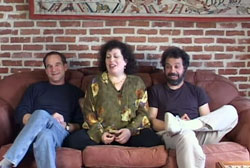
Ed: Yeah see... No, but also it's "communicating with the dead", is the name of the program that is gone in our stead.
[0:00:22 through 0:00:35 - Text overlay indicates Marshall Herskovitz sitting at viewer's left, Winnie Holzman in center, and Edward Zwick at right.]
Marshall: Oh, that one! I thought you were talking about "The Bachelor".
Ed: Well yes...
Winnie: ...I'm actually talking about both.
Ed: ...I was, I was...
Marshall: And that was communicating with the dead also.
[Laughter]
Winnie: As it, as it happens.
Ed: Oh my god, I...
Winnie: Yeah those were both two, uh, really frightening shows. Boo? Yeah.
Marshall: Ok.
Ed: Hi.
Marshall: ...They'll just go on forever, you have to...
Ed: Yeah, stop, jump in...
Dan: I don't mind!
[Laughter]
Dan: It just gave me a chance to check the audio. Uh, thought I'd start out, introducing yourself since, uh, you know you're the only one with a photograph on MTV, so you're the only one...
Ed: I have a photograph on MTV?!
Dan: You do! So...
Ed: How hip! I gotta go look that up...
Dan: ...If anybody ever tries to stalk you, why, you've got a photograph...
Ed: Oh, that's good to know.
Dan: Yeah I know, I'm sure you're loving that. But uh, so...
Winnie: [Giggles]
Dan: ...Introduce yourselves, saying what you do for here and ..
Ed: ...People watching...
Winnie: [Pointing to her colleagues] I stalked them.
Dan: ...So-Called Life.
Ed: [Laughs]
Winnie: ...Umm, no, I'm Winnie Holzman, I wrote the pilot, and created the show. With a lot of help from them. [Indicates laughing cohorts]
Ed: We're them. I'm Ed Zwick, and we sat in admiration and took lots of credit and money for Winnie's hard work.
Winnie: [Laughter]
Marshall: And I'm Marshall Herskovitz and I actually did all the real work in My So-Called Life. We just used Winnie as a front.
Winnie: [More laughter]
Dan: How did the three of you [Unintelligible] start working together?
Winnie: I lost a bet.
[Laughter]
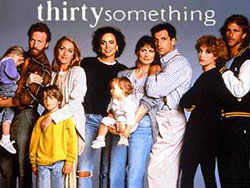 Ed: It, it dates back, in fact, to Thirtysomething.
All things flow from Thirtysomething and, Winnie actually came to us as
a kind of stalker. She happened to have had a brother [Ernest Holzman] who was shooting our television series, and...
Ed: It, it dates back, in fact, to Thirtysomething.
All things flow from Thirtysomething and, Winnie actually came to us as
a kind of stalker. She happened to have had a brother [Ernest Holzman] who was shooting our television series, and...
Winnie: I just came to visit him, and I stayed for like fifteen years.
[Laughter]
Winnie: I came to visit my brother on the set, and I stayed for fifteen years. This is really what happened.
Ed: That's about right.
Marshall: Ernie came to us and said, he was sort of embarassed and he said, um, "My sister has written a spec script for your show", and we went "Oh, god".
Ed: Yeah...
Winnie: Sounded, that sounds promising!
[Laughter]
Ed: Your whole bio, you just begin to sink, when you hear that, because, you know, the obligation to read, even your own work is hard enough with the stuff that you have to and the notion of having to be nice, to the sister of the cinematographer was just, beyond, anybody's imagining.
Marshall: Imagine our shock when it was actually brilliant, so...
Winnie: And I'd been watching the show, of course, as a fan, really, kinda blown away by the show and, really was just a fan of the show, so I ended up having this amazing thing happen where I was suddenly writing, my favorite sh-, you know, my favorite TV show. So, anyone, who make that makes sick, just go ahead and be sick!
[Laughter]
Winnie: Um, but that's what happened to me that year.
Ed: And, and that was, the beginning of it, was it three years of that or two years of that?
Winnie: That was for two years...
Winnie: And then right around the time that you realized that Thirtysomething was going to go off the air you kind of started to talk to me about what would we maybe do for another show.
Ed: I think it's important to [Unintelligible] back up to say, to... No, to just say what, I mean, those two years had been, the creation of a kind of a, of a short-hand, and a tenure that was to endure, because- The notion of, of trying to then, you know [Unintelligible] our [Unintelligible] together and do something together, was, unimagined for the two of us, before the three of us began working together.
Winnie: Yeah, except, I mean, I felt the second I started working with them, it's funny to happen to sit here and talking about that but it was really easy to work with them, it was really effortless and it had a ... it wasn't effortless because of course it was exhausting ...
Marshall: Yeah, that's what every writer has said about us.
[Laughter]
Winnie: I felt a special communication and ease in terms of that actually made it an ... I mean, I was always nervous about my own work but I was never nervous about working with them [points to Ed and Marshall] and somehow it was a safety feeling and a feeling of comfort that I think really is what to some extent is a big part of "My So-Called Life" actually, that I felt a kind of protective... I felt that they would not going to let me fall, and they also wanted me to be me --- as much as corny as that sounds --- so because they wanted those things and I could feel that I really did feel free to be me and that's how the show resulted I think.
Marshall: Yeah, that's very interesting, because even the genesis of that show was very collegial. We had all been thinking in our various ways about the teenage years and what that experience is alike. I had done a pilot for Showtime several years before about a teenage boy that sort of experimented with some of the same ideas of being "inside" a kid's head and what it's like to be that age and how difficult. And I remember we talked about that [points to Winnie] and you had your own concerns.
Ed: By the way, even years before that I ... and you as well [points to Marshall] had worked on a television show called "Family" ...
Winnie: Right.
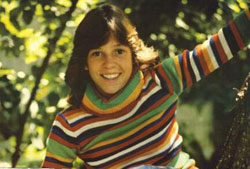 Ed: ... and the thing that was actually one of most
appealing thing for each of us to wirte was about this teenage girl,
Buddy Lawrence, played by Kristy McNichol,
and yeah, I think we each felt constrained by some of the limitations
that we perceived about how honestly to draw that character. And in
some sense, Angela Chase is a spiritual ...
Ed: ... and the thing that was actually one of most
appealing thing for each of us to wirte was about this teenage girl,
Buddy Lawrence, played by Kristy McNichol,
and yeah, I think we each felt constrained by some of the limitations
that we perceived about how honestly to draw that character. And in
some sense, Angela Chase is a spiritual ...
Winnie: [nodding] ... descendant ...
Ed: ... descendant of that character. But the great part was when we began talking was how it actuially came about the voice itself ... and I think that was a thrilling part to me.
Winnie: Yeah, and my memory of that is that in first conversations about the show we might do, we were talking about a diary, we were talking about maybe the girl keeps a diary [Ed and Marshall nod] and then I was ... and at one point I was just sent off and "go and write the pilot" ...
Ed and Marshall: [interrupting] No, no!
Marshall: We send you to do research ... that was the best part .. at gunpoint...
Winnie: No, no, that's not true, that was ... my memory of it is that I called you [points to Ed] at one point and you --- or you called me probably cause I was afraid to call you -- and you said like, where are you ... and I went "Oh, I can't write" and you said "why don't you just try to write her voice..."
Ed: ... write in the voice, .. and you wrote this first person ... long...
Winnie: Right, write her diary, but I said like, "I can't write, I can't start".
Marshall: That's right. I remember when you came in with that stuff. It was amazing.
Winnie: That stuff was the beginning. And some of that stuff ...
Marshall: But weren't you going to the high school? I think you said ... I think you had .. I think you said "it was exactly the same as when we were in school".
Winnie: No, no, yeah, yes, I mean, I couldn't believe it, yeah. I went to Fairfax High, which is a high school here in L.A. and there was a program through the Writers Guild where you could guest-teach, you know? I walked out there, dripping with sweat, you know, it was one of the hardest things I've ever done in my life, it was ... very few kids in that class even spoke English as a first language, it was unbelievable hard. But even with the fact that it was such a different time and a different school than the high school I belonged to, it made me so feel free. [to Marshall] You're right, I forgot about that. It made me feel so free because I went "Oh my God, high school doesn't change". There are those same sounds, there's that same clock that you're staring at. There's that same bizarre thing that other people are doing in class that you're staring at.
Ed: And above it all, some of it Marshall had written really well when he had done that thing and that we talked about all the time, was the feeling of imminence. The notion that everything is important, that everything has stakes of such importance.
Winnie: Yeah, like, an emergency situation.
Marshall: Everything is an emergency situation. When Winnie came in, it was just three pages, it was just...
Ed: ... single spaced, it just looked like a sixteen year old ...
Marshall: ... it was just a voice over. That all it was... just a voice over.
[Winnie laughs]
Marshall: ... a voice of a girl talking about ...
Winnie: That's right, that's how it was ...
Marshall: It was amazing, it was really amazing, it was like ... I remember Ed and I looking at each other saying: "Okay, this is great."
Winnie: And some of that stuff was in the pilot...
Ed: ... actually in the pilot ...
Marshall: Absolutely.
Winnie: Definitely.
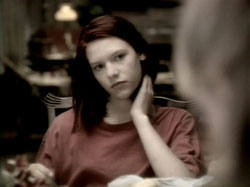 Marshall: "Watching people chew" [all laugh] "like they actually do it in public"
Marshall: "Watching people chew" [all laugh] "like they actually do it in public"
Ed: Or "lately i can't have a conversation with my mother without wanting to stab her repeatedly with a fork."
Winnie: All that stuff was probably there, right, and that was ... and do you remember that originally it was supposed to be an half hour?
Ed: Oh, not only do I remember, I remember we actually did it first as an half hour and it was promising but unsatisfying, it was too short, that it didn't go deep enough, it couldn't fulfill it's promise.
Winnie: Right.
Marshall: ABC said to us they couldn't schedule an half hour ... like that. Could we please make it an hour? and we actually worried somehow we'd ruining it by making it an hour.
Winnie: But I was happy making it an hour. I can remember being really relieved.
Marshall: That's right, it was definitely the best way.
Marshall: So then they gave us the green light to go ahead and make the pilot and when we started casting ... looking for the girl. Because we had said to them: There is no show if we don't find somebody great .. for this girl. And the first casting session...
Winnie: ... very first one ...
Ed: ... very first one ...
Marshall: ... the first girl who was bought in was fourteen or fifteen year old Alicia Silverstone.
Marshall and Ed: She was very very good.
Winnie: She was emancipated.
Marshall: And I remember she walked in to the room and we looked at each other and said "that girl is really good" and yet we said "she's so beautiful and she's so self-posessed and there's got to be something about Angela Chase that ... who's not yet formed ... that she doesn't know how wonderful she is .. that she's wonderful and yet... somehow not completely together inside" and you know -- how you could look at Alicia Silverstone and saying she's lacking anything but ... she was lacking somehow that doubt, that sort of mixed-upness inside. And then ... in walks Claire Danes ... the next person.
Winnie: The next person.
Ed: Well, I think it's important to give credit to Lindsay Lohey[sp?], who spent a lot of time meeting a lot of people whom we didn't meet.
Winnie: But who also said to me when she very first read the pilot .. "There's a girl in New York and her name is Claire Danes" ... said that to me.
Marshall: ... who was thirteen...
Ed: ... who was just thirteen and had done just one guest shot on some show that Linda had seen.
Marshall: "Law and Order".
Winnie: That's right.
Winnie: And also was com... was flying out here to audition for Steven Spielberg
Marshall: And just ... we're talking here about a series that's been off the air for six years and the girl who was the star of our series had already been on "Law and Order" which is still on the air
[All laugh]
Ed: And we had actually two shows come and go since that by the way...
Winnie: And there's actually a lot of "Law and Order", there's "Law and Order" Petty Theft now, "Law and Order" Jaywalking, they have "Law and Order" for everything now --- which is good ... it's important that there be more.
Ed: More "Law and Order"?
Marshall: Just in general.
[more laughs]
Marshall: Anyway, after Claire Danes walked out of the room, we got to do another, even bigger fight because she...
Winnie: ...she was so young...
Marshall: There's just no way you can do a television series around a girl who's actually thirteen years old because her working hours are so limited -- we could never do the show ...
Ed: It's also important to just remember that most shows about teenagers had always been played by people above eightteen, because they had the majority, they could work longer and could actually do someting in which the obligations of filming could be served. There's just ...
Winnie: I mean people were making "The Wonder Years", but again "The Wonder Years" were thirty minutes.
Ed: That's right.
Winnie: And the idea of trying to make an hour show that starred this girl, the hours she'd have to work ... they [points to Ed and Marshall] were going ... the math ... it just doesn't compute.
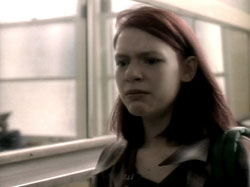 Marshall: So one faction said "You can't make the show
with her" and the other faction said "You can't make the show without
her". Luckily that faction won. And somehow we figured we'd just make
it work. By the way, when Claire Danes came in that day, she was doing
a scene were she was being confronted by her best friend who was later
played by devon Odessa. And there's a moment in the scene where the
enormity of what she'd done in rejecting her friend, catches up to her
and I think it even said in the script "welling up" or "tears up" or
something like that: When Claire read it, her entire face turned red,
her eyes teared up and she started to cry as she kept speaking. And it
was so obviously real what she was going through, it was a physical
reaction. And when we brought her in to read again a couple of weeks
later... when she got to that line, the exact same thing happened. When
we brought her to the network, the exact same thing happened. And when
we shot the pilot ... on each take ... from every angle the exact same
thing happened. She's the most astonishing ... you know sort of
"creature", "instrument", "performer", "artist", her ability to ...
it's so profound, it's so deep.
Marshall: So one faction said "You can't make the show
with her" and the other faction said "You can't make the show without
her". Luckily that faction won. And somehow we figured we'd just make
it work. By the way, when Claire Danes came in that day, she was doing
a scene were she was being confronted by her best friend who was later
played by devon Odessa. And there's a moment in the scene where the
enormity of what she'd done in rejecting her friend, catches up to her
and I think it even said in the script "welling up" or "tears up" or
something like that: When Claire read it, her entire face turned red,
her eyes teared up and she started to cry as she kept speaking. And it
was so obviously real what she was going through, it was a physical
reaction. And when we brought her in to read again a couple of weeks
later... when she got to that line, the exact same thing happened. When
we brought her to the network, the exact same thing happened. And when
we shot the pilot ... on each take ... from every angle the exact same
thing happened. She's the most astonishing ... you know sort of
"creature", "instrument", "performer", "artist", her ability to ...
it's so profound, it's so deep.
Ed: I think, just parenthetically ... the limitations of her hours I think ended up contributing to the nature of the show, because we were obliged to expand the focus to the rest of the ensemble. And that was a gift because ...
Marshall: ... her parents also.
Ed: ... things just got richer ...
Winnie: You had to, you had to: the formula was that there were in every act --- four acts --- there had to be at least two scenes that Claire wasn't in or we couldn't shoot the show. So what I noticed is for me it was exciting. I responded to that like I was working a puzzle. I actually hate puzzles so I don't know why I said that. But I somehow ... that opened my mind and got permutations going that I like to do anyway. The temptation would be to use Claire in every scene if we hadn't had that law because you couldn't not want putting Claire in every scene because she is so incredible and writing for her was such a joy. Because you also always knew, that no matter where you took her, she would go there and more. So it was thrilling. But this forced me to ... not write her in two scenes in every act ... at least. And the rest of the cast was very very strong and exciting. So it brought on all kinds of interesting relations.
Ed: The great thing is you had written a character called "Rickie" ...
Winnie: I don't know how that happened.
Ed: I don't know where he sprung from in your mind but what was most remarkable is when Wilson walked in and he was indeed exactly the character you imagined.
Winnie: Down to everything ... down to the race ... I wanted ... I think I said "he's half latin, half black", I mean I saw him as someone with great style. He really did embody that character.
Marshall: He was a dancer.
Ed: [unintelligible] ... inception he was.
Winnie: Right. It was amazing that kind ... you know, just even finding Claire was a mircale and amazing but then -- you [pointing to Ed] truly ... once called it to me "lightning in a bottle" and that's what it really was, that ...
Marshall: It fact Wilson by the way, had never acted before.
Ed: That's right.
Marshall: We just said: Who cares!
[laughter]
Winnie: Yeah, it doesn't matter. He was so charming and fun and we liked him right away and that made ... you know, people said to me so many times that year and later ... "oh, how much trouble did the network gave you over that character, how many hate mails did you get?" Well, the reality is I don't remember getting too many hate mails, I maybe got one, I don't remember too much objection...
Ed and Marshall: No
Winnie: And I think it had to do with the sheer force of his personal warmth ...
Ed: ... sweetness, yeah.
Winnie: ... and he was so loveable, people just let it go and really just embraced him and it was so helpful in terms of what we were trying to tell.
Ed: Also because his alienation mirrored hers. And you know, that really sort of created this third thing, which is what they shared. But each time I remember, when the persons walked in first, I remember when we first met Jared.
Winnie: Oh, I remember all of them. I remember Devon...
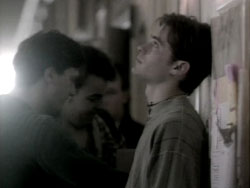 Ed: Your reaction to Jared was exactly the characters reaction upon first seeing him.
Ed: Your reaction to Jared was exactly the characters reaction upon first seeing him.
Winnie: Oh, I was overwhelmed by Jared. [laughs] But also, I didn't want to use Jared. I was frightened...
Ed: I believe it.
Winnie: ... by how gorgeous he was. That was insane. I had an insane reaction to him, which has never happened to Jared, that doesn't happen to him, women don't have insane reactions to him, ever [smiling]. But you know, Jared was a complete revelation. He was just supposed to do the pilot. We never even thought of him as a series regular, but you know, he was so amazing and he also was another one who just .. I have to say that all the younger people in the cast were so delightful to work with, they gave a 110% every minute. And Jared was always ... you couldn't catch him acting. He was always real, he was always bringing something very real and honest...
Marshall: The funny thing is he kinda did a number on us in the beginning. He was pretending ... that he was that kid...
Ed: Yeah, it was almost [unintelligible] in character ...
Winnie: [laughs] I don't think he wanted to do it.
Marshall: It took us to know him and we were "Oh my God, he's very articulate, incredible smart"
Winnie: He's so smart, deep and profound ...
Marshall: ... totally commited as an actor -- he was pretending to be that guy when we first met him.
Ed: Yeah.
Winnie: Well, I'm not so sure he saw himself on a tv series.
Ed: Neither did we.
[laughs]
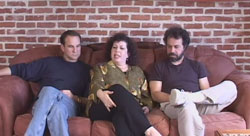 Winnie: So we agree on that point. [laughs] He's ...
My memory of writing the show partly is just the joy of these younger
actors because you were never disappointed by them. They were so up for
anything. They were so interested in bringing themselves...
Winnie: So we agree on that point. [laughs] He's ...
My memory of writing the show partly is just the joy of these younger
actors because you were never disappointed by them. They were so up for
anything. They were so interested in bringing themselves...
Ed: They were also in such transition, each of them. I mean, the difference between Devon Gummersall when he began working with us and when we ended, it was as if ... I mean now that my son has grown past that point ... it was similar, it was literally seeing someone change before your face.
Marshall: Do you remember when we went to Portland to that highschool ... with Devon?
Winnie: Of course.
Marshall: And all these girls descended upon him.
Winnie: Yeah.
Marshall: And I saw the look on his face. And I remember turning to you saying: "Oh my god we're seeing it happening in front of our eyes" ... that he's realizing his own attractiveness.
Ed: Yeah, it was the main story of the show.
Winnie: We were all realizing everything sort of it right as it was happening.
Ed: That's the difference about using kids the very age that they supposed to be.
Winnie: Right, that's a big part of the excitement of the show, I think, of what we were capturing.
Ed: And that's without taking anything away from Bess and Tom, I mean it's important to say a word or two, because Bess...
Winnie: They were incredible.
Winnie: Oh, we also took them places, I mean...
Ed: It's also important to even think about the role Bess played not just on screen but off. She's this extraordinarily warm person and she opened herself to these kids in a remarkable way...
Marshall: ... nurtured them ...
Ed: ... and to this day those relationships are very important and sustained. And you need that.
Winnie: Right, she was incredible. Absolutely. And it sort of started right away. The show was short-lived but we packed a lot in. From the minute we met, everyone had ... there was a lot of intense connection.
Ed: But ironically .. because of it's checkered sort of airing history it spread out over a much longer period .. it was two and a half years only to do those episodes.
Winnie: They all doubled in size... when we came back. Because, you know, what happened was we made the pilot and then they didn't pick up the pilot when they normally pick up pilots. There was this long wait and in that wait, the kids were getting taller.
Marshall: They ordered only six episodes...
Winnie: And yeah, then they only ordered six...
Ed: Only for the next season they ordered...
Winnie: It took a really long time for us to get back into production.
Marshall: I remember by the way, speaking of Bess, in the beginning, Bess was the only grown-up who wasn't sort of undone by Claire. Because we all had this experience when we had talked to Claire, that you were in the presence of sort of this genius, and you would find yourself talking to her as if she was twenty-nine. And then you realize "Oh my god, she's thirteen". And then you were suddenly caught, not even really knowing how to speak to her.
Ed: Well, you wouldn't know how to pitch your sensibility. You don't want to blow her away by talking about your own ambivalence about things or talk about things that were too dark and yet you knew that she could internalize them and understand them and it almost invited that. So it was always very confusing I think.
Marshall: And she was willing to be sort of a kid with Bess in some way.
Winnie: Yeah, it was.
Marshall: So funny.
Winnie: One vivid memory I have of the pilot was when we were shooting that moment, that whole sequence where they were waiting to get in to the club but they never do get into the club and they're just waiting in the parking lot and that's their whole adventure.
Ed: It was actually a show about what not happened, it was sort of our tradition.
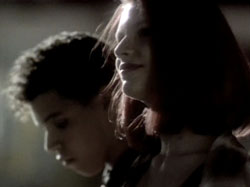 Winnie: I remember at some point, Wilson came up to me
and he said, he just whispered .. "I'm so intimidated" --- I don't know
if he used the word intimidated, but he said --- "I'm so intimitaed by
watching her act." He meant Claire because Claire is so amazing. And I
said, "don't let it intimidate you, it's a gift, you know, let's learn
from her ... look at her and learn." That's what I said to him and I
know that there was something about being in a presence of someone who
was so gifted and so graceful. Claire had such an inner grace, that you
could get intimidated, it had happened to me actually, which was
probably why I was able to say that to him. I think, it was neat
because I was learning a lot that year and so were they I thought ...
it helped me... I felt like it because I was where they were in a way.
Because I was just learning the way they were.
Winnie: I remember at some point, Wilson came up to me
and he said, he just whispered .. "I'm so intimidated" --- I don't know
if he used the word intimidated, but he said --- "I'm so intimitaed by
watching her act." He meant Claire because Claire is so amazing. And I
said, "don't let it intimidate you, it's a gift, you know, let's learn
from her ... look at her and learn." That's what I said to him and I
know that there was something about being in a presence of someone who
was so gifted and so graceful. Claire had such an inner grace, that you
could get intimidated, it had happened to me actually, which was
probably why I was able to say that to him. I think, it was neat
because I was learning a lot that year and so were they I thought ...
it helped me... I felt like it because I was where they were in a way.
Because I was just learning the way they were.
Marshall: You know there's something else about the pilot I really want to mention, which is Scott Winant had been a producer on "thirtysomething" and had started directing on "thirtysomething" and he was one of our best directors ... but there is still a way in which the pilot of "My So-Called Life" was a leap forward for everybody involved and his work as a director on that was so astonishing. I remember after the first thirty seconds of the first screening I turned and said "Well, this is great". It was just some way in which he took Winnie's material and just ran with it and the two just kind of resonated back and forth.
Winnie: That was definitely ... he understood it.
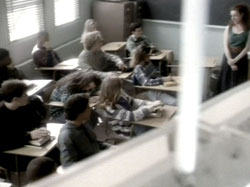 Ed: Right, he brought to it his own alienated
understanding of that moment, and not just in that moment in the past,
but his own world view, so that it could be present. It wasn't just
something remembered, it was very contemporary. And he made it happen
on screen. The most vivid image of ... which will always stay with me
... are the flourescent lights, because from the minute I saw that in
his work, that almost was his kind of metaphor of something shorting
out, something not working, kind of a distraction that takes you away
from this moment inside. And I thought this is really gonna be
something unique.
Ed: Right, he brought to it his own alienated
understanding of that moment, and not just in that moment in the past,
but his own world view, so that it could be present. It wasn't just
something remembered, it was very contemporary. And he made it happen
on screen. The most vivid image of ... which will always stay with me
... are the flourescent lights, because from the minute I saw that in
his work, that almost was his kind of metaphor of something shorting
out, something not working, kind of a distraction that takes you away
from this moment inside. And I thought this is really gonna be
something unique.
[First speaking pause after almost 25 minutes]
Dan: I spent so long collecting these questions and you just answered the first twenty.
[laughter]
Winnie: We spent a lot of time. We make that up to you somehow. Those are days you'll never get back.
Ed: Ask more!
[some noise outside the office]
Marshall: Should we tell them to be quiet out there? Are you picking that up?
Dan: I don't think so, no.
Marshall: You're okay.
[some more noise outside the office]
Ed: Oh, so he's here. [refers to Tom Cruise who just arrived outside to talk about their project "The Last Samurai"]. So I have to jump out. You know what, you continue. It was a pleasure. Say only smart things you two.
[26:30 --- Edward Zwick leaves.]
Winnie: This is sort of recreating what happened.
[laughter]
Winnie: Actually, I just realize, cause after we finished the pilot, he had to go.
Marshall: That's right.
Winnie: He had to go to do "Legends of the Fall".
Marshall: [joking] And that's when the show got really good. Oh, sorry...
Winnie: But isn't that funny, I mean metaphorically... Life is funny.
[pause]
Dan: The IMDb said the working title was "Someone Like Me"?
Winnie: Yeah, it's not that it was a working title. Yeah, it was a title that I had. It was a possible title. I felt I could do better. And so did everybody.
Marshall: Yeah, it didn't last that long.
Winnie: I remember some day having a vote on [unintelligible]: Who likes better "Someone Like Me", who likes better "My So-Called Life". and everybody liked "My So-Called lIfe" better.
Marshall: I don't remember there being much of a question once you came in. I remember you once saying "Oh I got a great new title". And we said "Oh that's great" and that was sort of the end of our discussion.
Winnie: I loved the title once I thought of it, it just took me a second.
Dan: Thanks.
Winnie: What did you say? IMB?
Marshall: IMDb, Internet Movie Database
Winnie: Ah.
Dan: Over the two and a half years it took to film the show, ... did you film them in order?
Winnie: Oh sure.
Marshall: In order, but there were long streches were we're down.
Winnie: We were in order, of course, yeah, that I wouldn't would have wanted to [laughs]. Oh I think we might have flipped one of them. I think the one...
Marshall: I don't remember that.
Winnie: The one that Claudia [Weill] directed that ... the one with Rayanne's drug overdose, the one...
Marshall: Oh this is ringing a bell, I think we put something before that.
Winnie: Forgive us, that was a long time ago. I mean ... it's not important.
Marshall: Actually, we do that all the time, on "Once and Again" we flipped all sorts of episodes for all sorts of reasons.
Dan: There wasn't any gaps [unintelligible] noticable ... someone getting older...?
Marshall: We actually lucked out.
Winnie: Devon Gummersall was the one who really changed.
Marshall: Yeah, but it served us. Because it was how we saw the character.
Winnie: It was interesting.
Dan: Excellent. Was there anything that you would have liked to have done on the show in terms of storylines and characters but couldn't afford it for some reason or another?
Winnie: I have to say it was a very fulfilling experience in that the things that came to me to do are the things I did. If I had more time, more things would have come.
Winnie: It was not our practice to plan way ahead in things that weren't ordered.
Marshall: From the very beginning we constantly felt we were on the edge of the [unintelligible] anyway, so we couldn't allow us to think that much ahead.
Winnie: I mean, I was liking the stuff I was doing at the time. I felt like I was... I mean, maybe this isn't how it was... but how it felt was that I was responding to what I was seeing, right there. If you know what I mean.
Marshall: yeah.
Winnie: ... and I was just playing with things that seemed to come out of things. Like the way Jared emerged as this fascinating actor. So I wanted to, of course, bring out more about him, and the same with Wilson, [who] emerged as this fascinating actor. And all of the women ... the young women. Obviously I've spoken about Claire... but those two other women, Devon Odessa and A. J. Langer, I wanted to bring them together more, because I thought, I'm interested anyway when I write about people who are polarised slowly coming together.
Marshall: That was one of the most fun parts for me. That relationship between those two characters.
Winnie [nodding]: Yeah. I mean, I was... that was totally me going... I mean that's what I love to write; is I love to polarize people and then see what it is that could maybe bring them together.
Marshall [chuckles]: You know, what's great, is that they openly hated each other...
Winnie [laughs]
[Winnie and Marshall talking at the same time]
Marshall: but actually liked each other and didn't know it -
Winnie: - had a, had a friendship...
Marshall: ... but couldn't help it ... couldn't help it.
Winnie: ... that they had no idea it...
Marshall: ... it was great - yeah...
Winnie: ...was existing, exactly... and, and you know, again, it was all about necessity, you know if someone had suddenly said to me 'you have to suddenly write six more', of course I could have, but I wasn't about to think about them, unless somebody said that to me... because, you know ... why do that?
Dan: When you wrote the final episode, did you know at that point that there wouldn't be any more?
Winnie: No, that's why the episode is the way it is. I mean, the episode... I was pretty...it was really unclear.
Marshall: By the way, it came right down to the wire...we were actually...
Winnie: ...it was unclear.
Marshall: ... thought we were going to be picked up for one more season, and all sorts of complexities got in the way. I mean, we've talked about this before openly, so there's nothing really to keep secret, I mean, you know, Claire at that point, because it had been two and a half years, really wanted to move on with her life, really wanted to do movies.
Winnie: Right.
Winnie: Totally.
Marshall: ...we were committed to the show, everybody else was committed to the show, people were fighting for the show so hard, and there was some bad feeling at that moment. It went away, shortly thereafter, but it was very painful. And ABC, you know, did not want to get into any kind of a public dispute with a fifteen year old actress about whether she should come back or not, so I know that that influenced their thinking. But they had never supported the show anyway...
Winnie [interrupting]: But the truth is, yeah, the truth is as we all know ... if they really wanted the show back...
Marshall: oh yeah.
Winnie: ... you know... so I think they used that a little bit. They were... at least, it was convenient.
Marshall: Well, they were so on the fence, and ...
Winnie: ...they were so on the fence ...
Marshall: ...so on the fence, and the way they promoted the show was so wrong-headed.
Winnie: ... right. Well, they didn't understand what this show...
Marshall [interrupting]: ... they didn't know what they had.
Winnie: ... could be. They didn't see it as a moneymaking venture, for some reason ...
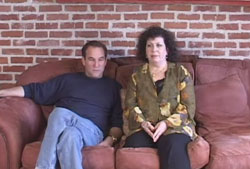 Marshall [interrupting]: it's hard, bec...
Marshall [interrupting]: it's hard, bec...
Winnie: It's hard for me to understand it still ...
Marshall: it's hard because...
Winnie: ... that they did not see it as having business potential, or legs.
Marshall: The culture has changed so much in the past six years regarding young girls, that in 1994, 1995, a huge corporation like ABC did not understand that there was a market... you know, out there, of teenage girls.
Winnie: Well, all I would hear that whole year ...
Marshall: They had no interest in them.
Winnie: All I would hear, that whole year, from the Network -- when I did hear from them -- was 'oh, you don't understand, only teenage girls are watching the show.'
Marshall [laughs]: yeah.
Winnie: First of all that wasn't actually the case 'cause a lot of those teenage girls were 30 year old men [laughs]
Marshall [laughs]
Winnie: ... but you see what I mean? Two seconds later, that became the goal. So, it was a really odd moment in time.
Marshall: It goes even further than that. We had a conversation with Bob Eiger at ABC, when the show was on the bubble, as they like to say, where we actually said to him 'look, this show is giving a voice to millions of people in the culture who have no voice. You are making money on the show, you are making money as a network. You should keep the show on the air as good corporate works, that's why you should do it.' Because, that's how different the world is now ... just 5 years later, 6 years later, from then, they could not see the economic value and appeal of the teenage girls.
Marshall: sure.
Winnie: ... part of the joy of it was feeling like we all wanted to do it, and I love her and admire her and you know.in other words, even if she had somehow been persuaded to do it, part of the joy and excitement and happiness would have gone out of it for me, because I really was dependent on that feeling that we were all really committed to it. Because it is a lot of work. So for me, it was, a ... weirdly blessing, a relief... to have it end when ... at a time when we had all still enjoyed it. If you know what I mean?
Marshall: Sure, sure.
Winnie: I mean... I...
Marshall: You've never said that before [laughs]
Winnie: It's true though. I...
Marshall: No, I understand.
Winnie: I couldn't say it back then because I was too jaggled up, you know, and there was too much going on, but I actually did realise that shortly thereafter. You know I haven't ever said that before but it's true because, I don't want to make it sound like if they had... if they had ordered it of course I would have gone and done my best, and had [a] good season.
Marshall: You know... the fact that the show was picked up by MTV, and became such a hit on MTV, and became its own... you know, I don't want to use the word 'legend', that's too big a word... but there was a kind of aura..
Winnie: a cult.
Marshall: about the show.
Winnie: right.
Marshall: ...that like all things that, you know, die too young, that helped it, in a way, that the show was all potential, still, and something that was killed off in its prime and ...
Winnie: Right.
Marshall: ... and maybe it's for the best finally.
Winnie: Well, I feel it is.
Marshall: ... that there are just those few episodes.
Winnie: I mean ... I feel it is. I mean ... ultimately, you know, I feel like there's a rightness to how short it was and ...
Marshall: mmm hmmm.
Winnie: um.
Marshall: It was adolescent, in that way.
Winnie: Yeah, it was... yeah.... there's a rightness, and there was.... it was a burst of energy, and certainly Claire and everyone else in terms of the cast, gave their all and ... I gave my all, and other people too, not just myself, but I mean, there was a coming together of ... on full throttle... So, it's impossible to look back on that and go 'gee, if only there had been more', because there was a lot that happened, and it was fulfilling.
Dan: Do you guys feel in any way ... godparents, so to speak, to the ongoing crop of ... teencentric shows that ...
[Winnie and Marshall laugh]
Winnie: I don't feel like a godparent, no, they ... you know. No.
Marshall: You know, it's just... it's just...
Winnie: I didn't see it as a teen show, weirdly, even though it was, I admit. I don't admit it ... I didn't see it that way, I have to admit, I wasn't writing a teen show.
Marshall: No.
Winnie [to Marshall]: Do you know what I mean?
Marshall: Of course... you know...
Winnie: I didn't ...see...
Marshall: you were ....
Winnie: I didn't look at it that way.
Marshall: ... you were so inside the experience.
Winnie: yeah.
Marshall: ... that implies some exploitative or ....
Winnie: yeah.
Marshall: ... objectifying aspect of it.
Winnie: and those other shows ... I'm not saying what they are 'cause I really wouldn't want to say what they are; it's not for me to say, but I just know that's not how I viewed our show.
Marshall: We take some comfort in knowing that we actually were ahead of our time on this one, and that feels good.
[long pause]
Dan: So, thinking about ... ABC ... and ... trying to ask it positively, what is it that you enjoy about your working relationship with ABC that you keep making shows for them?
[Winnie and Marshall laugh]
Winnie: He said... you said that so politely and so kindly ... [laughs]
Marshall: Well, but there's actually...
Dan [unintelligible]: ...the question...
Marshall: No but, you know what? There's actually a lot to say about ABC, um, you have to understand that when we first went in to do 'Thirtysomething' we established a relationship with their executives whereby we do exactly what we want to do. We get no notes from them, they don't ever try to intervene in what we're doing or how we do it, and the show lives or dies by our judgement about what it should be. Now ...
Winnie: and that was true of My So-Called Life.
Marshall: and that was true of My So-Called Life. it's been true of 'Relativity', it was true of 'Once and Again'. That's why we've stayed at ABC, because that's very difficult to get at any network, and we are happy to take responsibility for the success or failure of our shows. I can blame ABC for how it promotes our shows, or how it ... in the case of 'Once and Again' how it moved it too many times. But that kind of creative freedom and creative support is very rare in television and it's why we've stayed at ABC.
Winnie: I mean, I think you have to wonder what ... which other of those networks would have put that show on air... in the first place.
Marshall: Right.
Winnie: Um, and then I think you have your answer. I mean, it's more fulfilling to ... far more fulfilling ... to have done that season, that slightly shorter season of My So-Called Life, and done it as I wanted to do it, as I saw it, you could say.
Marshall: Mmm hmmm. You bet, you bet.
Winnie: You know, than to have been offered 4 or 5 years somewhere where I was constantly being questioned and told, and haggled with.
Marshall: ... where you were miserable.
Winnie: Yeah, miserable ... and this way I was only ... I only had to make myself miserable, which I was really good at doing sometimes, but I had nobody who was really making me miserable.
Marshall: Did you just put your glasses on?
Winnie: I did.
Marshall: Why did you do that?
Winnie: I have no idea.
Marshall [laughs]
Winnie: ... but sometimes I wanted to, you know ... I don't know.
Marshall: ... you wanted to see the audience better.
[both laugh]
Winnie: yeah, 'cause there might be someone out there I know.
[both laugh] [pause]
Dan: What what do you think about the adulation, and the adoration that My So-Called Life ... I mean, here it is, six, I mean almost seven years later ... and you know, the DVD pre-order sold out, in like 3 weeks, ... you know, people are still, you know ...
Winnie: 'Cause the people that ... loved it, really loved it with a passion, and that was the part, business-wise, if I could call it that, that I didn't understand in terms of the ABC reaction.
Marshall: Mmmm hmmm.
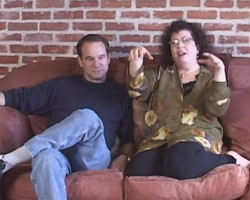 Winnie: See there's one thing to have huge ratings, and obviously
that's a lovely thing, and people do want that in ... for business, and it
means something. But there's another thing to have that kind of
passionate reaction happening with smaller ratings. That means something too,
business-wise. I've never understood why that was never milked, or
used.
Winnie: See there's one thing to have huge ratings, and obviously
that's a lovely thing, and people do want that in ... for business, and it
means something. But there's another thing to have that kind of
passionate reaction happening with smaller ratings. That means something too,
business-wise. I've never understood why that was never milked, or
used.
Marshall: Well, because it's ...
Winnie: ... or thought of as valuable. I mean ...
Marshall: I think it doesn't fit into their business models, that's all, and it's hard for them ...
Winnie: right.
Marshall: ... to understand.
Winnie: but it was...
Marshall: ... or to quantify what it means.
Winnie: Right, but it was... it was...
Marshall: You know.
Winnie: ... to me that was... if I had to say one thing that I thought was.. well, that had lack of imaginations ... that was it. Um.[pause]
Marshall: Put it this way: people have often asked us about all of our shows 'were you upset that more people weren't watching?' and that sort of thing, but people who go into this business, you know, in some way are performers. In some way, at some primitive level, it's still about being in front of an audience, and hearing them laugh or applaud what you're doing, and there is nothing so moving.
Winnie: yeah.
Marshall: ... or amazing as knowing that people are reacting passionately to what you're doing.
Winnie: yeah, millions of people.
Marshall: What more can I ask, as a film-maker?
Winnie: exactly, exactly.
Marshall: ... than to have what happened with My So-Called Life, you know, for the first time on the internet, you know, people sort of trying ...
Winnie: ... it exploded, right.
Marshall: ... to save the show and the huge, you know ... the ads they bought in Variety, and The Hollywood Reporter, the huge lengths they went to to try to save the show, for something that they didn't have to pay for, that came into their home, that had no significance in their lives in any outward way; I mean, what more could you ask for?
Winnie: Yeah, exactly. I mean, that experience ... changed me, in that it gave me the understanding of how hungry people are for an experience ... where they do feel connected to a story on a deep level, where they feel that the story fed them on a deep level, and it made me very touched by that, and want to do that more. That was really how I responded, is I saw the depth of that in my own life, you know, sort of played out, not, theoretically but I could see that that was real. That that was real for people, for millions of people, that they were responding literally to stories and characters.
Marshall: that's right.
Winnie: ... with so much love and, and need. And I was very touched by that and I wanted to do more of that.
Marshall: See, we work personally. We work using our own lives ... not always the facts of our lives ... but, but the inner truths of our lives, and by being personal, I think we evoke personal responses in people.
Winnie: yeah, that's.
Marshall: ... who watch the show, I mean and that's ... it's really that simple.
Winnie: yes, it's that simple.
Marshall: That's why people become passionately involved, because they respond as if they're responding to real people.
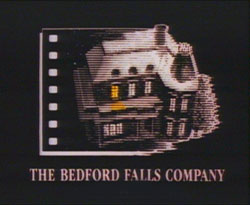 Dan: I've got many little unrelated questions, one of them being
something I read online... the claim that it's you and Ed singing the
jingle part of the logo [unintelligible]
Dan: I've got many little unrelated questions, one of them being
something I read online... the claim that it's you and Ed singing the
jingle part of the logo [unintelligible]
Winnie: Of course it is!
Marshall: Correct, it is, it is. Ed and myself.
Dan: That's awesome... yeah, I had some old highschool friends, came and visited me last weekend, and I told them I was doing this, and said, at Bedford Falls, and one of them said, 'ah, is that the one that goes.' [sings jingle]
[all laugh]
... so it's definitely memorable.
Marshall: oh, good.
Winnie: They, you know, they really shouldn't quit their day jobs.
Marshall: yeah.
Winnie: I don't see a recording career.
Marshall: I still have bruises from Ed beating the crap out of me because I kept going from the melody to the harmony because I couldn't tell the difference. He was ready to shoot me that day.
Winnie: Only that day.
Marshall: Of course.
[both laugh]
Dan: Going back to the fact that you, Winnie, started or stumbled into writing for thirtysomething as a fan, Sascha maintains all the fanfiction...
Winnie: I hope it also ... I'm sorry to interrupt, but I have to say in my own defense, I have to say because I always forget this part of the story ... that I had been a writer for years, I wrote a musical off-broadway, I mean it's not like I've never written before. Because sometimes when I tell that story, people really go "Oh, I'm just like you, I've also never written and watch shows on tv" so I have been writing, I just haven't been writing for television. I had not been making a living of writing, which was a new experience for me, after I met these guys, which is really pleasant. But I have to say that for young people who are watching that if you do want to be a writer, it's good to be writing and write whatever you can. And not just wait till the moment where you meet Marshall and Ed. Because one of the reasons that I did meet Marshall and Ed ... and they took me, is because I've been practicing my writing and I had been working on my writing. So I just wanted to say that. But wait, I interrupted your question. What did you want to ask?
Dan: I was just .. Sascha maintains the fanfiction section and he wanted to know if you ever checked it out.
Winnie: My daughter [Savannah Dooley] who's now seventeen, or almost seventeen has been the person who over the years has said to me periodically, "Mommy, you got to check out that site". She feels for all those people cause she just loves them and loves the stuff that they wrote. I just don't feel free to go there for some reason. Maybe it's just me, maybe, but she has so many times ... said to me, "oh you got to check out that site," she really admires it, she loves it. This started years ago, when the show first came down, when she was really young. And she'll even say that once we meet now .. "you should really go there" ... but I haven't.
Marshall: It's understandable. It makes sense. [pauses, to Dan] What else?
Dan: Yeah, there still people writing their own episodes.
Marshall: That's remarkable.
Dan: Do you have any specific, favorite on-set memories, [Unintelligible]
Winnie: Oh, I have, I do. There were a lot of really touching memories for me on that show. I mean, one of my favorite memories is just so small and nothing, but my brother did shoot the pilot of that show and the first I guess six episodes maybe or something around that ...
Marshall: There were more than that. At least.
Winnie: The first ten episodes maybe [Marshall nods]. He shot the pilot and I had never been on set with my brother working together, and here we were in a working high school. We were shooting in a real high school, which was actually in session, we were just given a little wing of it and the kids were like "What are you doing" and it was so interesting because we had to hold for the bells, for the high school bells. My brother and I went to the same high school, you know, we were two years apart, and our dad had died recently, and it was so touching to be with my brother in a high school again, it just brought back our whole youth and I smoked then and the funny thing was me and Patrick Norris, who also smoked, trying to find a place in this high school to smoke. And it seemed like everything was conspiring to turn me into a sixteen year old again, you know what I mean? My brother was there, it was so odd, we would see pieces, Scott would go "Look at that projector" ... we would see "projectors", that looked like from when we went to high school...
Marshall: I'm sure they were.
Winnie: ... in the seventies. It was like being frozen in time, it was so funny and touching and then I have ... I guess a really, happy memory for me, is at the end of the pilot... the pilot was just magical because everybody could feel how good it was going to be. You could just feel it. It's an odd thing to say but I just admit that it was true. We could all feel it, a lot of it had to do with Claire and how amazing she was. It had to do with everything though. And at the end, I remember my brother grabbing that shot that Claire and Devon do...
Marshall: Tell the Cameron Crowe story about that ...
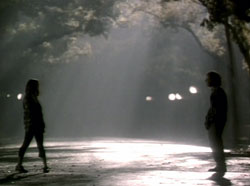 Winnie: Oh, well, do you know, what shot I mean, in
the pilot, when they are on either side of the street, and it's this
beautiful lightning ...
Winnie: Oh, well, do you know, what shot I mean, in
the pilot, when they are on either side of the street, and it's this
beautiful lightning ...
Marshall: It's night time.
Winnie: We were really late, we had to loose Claire any minute and everybody was a little tense, Claire's parents were a little tense ... we had to go, we had to wrap. And my brother goes with Scott -- the director -- they were like: "Let's grab this one shot" because my brother was saying how beautiful it was, and it was right in front of us. And he grabbed it and it became like one of the most beautiful images in the pilot.
Marshall: Yeah, it's like a signature of the show.
Winnie: And years later ... or a year later ... Cameron Crowe was casting "Jerry Maguire" and someone from that casting company called me and asked me "Who's that actress who played that funny guidiance counselor on your show?". And I said, "oh that's me." And she said "Oh, would you like to be in Jerry Maguire" and I said "sure". So, when I was on set with Cameron, he showed me that he had taken a polaroid of TV, he had taken a polaroid of the TV screen of that moment with Claire and Devon and he recreated a similar moment in "Jerry Maguire" cause he had so liked the look of it and the romance of it. And that touched me so much.
Marshall: Yeah, it's great.
Winnie: ... and also because my brother was instrumental in finding that moment, for seeing it. There was so much that touched me about that.
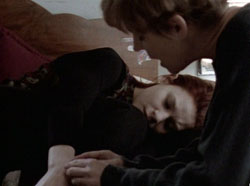 Marshall: I directed one of the early episodes of the
series [Episode 03 - Guns and Gossip] and there was a scene where
Claire was upset about what was going on with Jared's character and her
mother, Bess, comes in to the room and they have a scene on the bed and
Claire has to reveal to her mother that she's not having sex .. "to an
embarrassing degree" [both laugh] and during rehearsal I gave Claire
one direction which was when her mother goes into that unintentional
pompous description, you know, of birth control, Claire should just lay
down on bed and cover her head -- that was the only thing I said to
her. And we shot the master and we did one take and I think that was
the only time in my career as a director where I just had nothing to
say -- it was just perfect. It was just perfect. I said "okay", we did
one take of the master and then we did...
Marshall: I directed one of the early episodes of the
series [Episode 03 - Guns and Gossip] and there was a scene where
Claire was upset about what was going on with Jared's character and her
mother, Bess, comes in to the room and they have a scene on the bed and
Claire has to reveal to her mother that she's not having sex .. "to an
embarrassing degree" [both laugh] and during rehearsal I gave Claire
one direction which was when her mother goes into that unintentional
pompous description, you know, of birth control, Claire should just lay
down on bed and cover her head -- that was the only thing I said to
her. And we shot the master and we did one take and I think that was
the only time in my career as a director where I just had nothing to
say -- it was just perfect. It was just perfect. I said "okay", we did
one take of the master and then we did...
Winnie: ... like a documentary that scene ...
Marshall: Yeah, and we did coverage and we did one take of the shot ... one with Claire and it was perfect and we came around and did one take on Bess -- it was the fastest I've ever done a scene.
Winnie: That's my memory of Claire. Cause she
was always due at school, always about to take a french test, you know
she was always about to do her math, and so she ... and I mean to an
amazing degree ... she would go in with no rehearsal or virtually no
rehearsal and just nail something impossible and then run off and do
her ... I also remember that kiss in the car with Jared, that first
kiss... do you remember that [to Marshall] [laughs] ... I don't know
why I'm remembering that ... because I thought, "oh my god, you know,
is this going to be okay?" [laughs] Cause, you know, I had the tendency
to worry about her sometimes ... 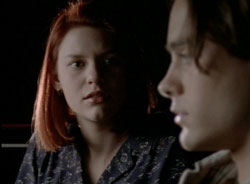
Marshall: Well, she was so young.
Winnie: She was so young!
Marshall: She may have been fourteen then but...
Winnie: She was fourteen then, you know, big deal, and you just wondered if, you know, if it was all alright. And she handled everything so beautifully. That was the episode where she does that little dance, before she goes inside.
Marshall: Oh, absolutely, that was great. Oh, I remember when we came back after our first run of six or whatever, it was a long layoff and we came back and it was the first episode with the new batch and Scott was directing again and I came down to the set and Claire was doing this scene in this incredible depressed manner, this dark manner. And I remember, I took Scoot aside and I said, "Do you think Claire is maybe too unhappy here" and I remember the look on his face and it was the same that I felt "You mean she could actually do something wrong?". It was like unthinkable, that Claire would need any direction at all. We just accepted what ever she did because she couldn't make a wrong move and it was most certainly believable, it just was pitched at the wrong tone and he went "oh my god, yes, you're right, there's no reason" and I remember he talked to her and she went "Oh yeah" ... and then she was fine ... you know.
Winnie: [laughs] Exactly.
Marshall: But I remember our shock that this fourteen year old girl would need any guidance at all.
Winnie: Yeah, because it was easy to think not. And I guess ... [to Marshall] why are you laughing...?
Marshall: I'm laughing cause I know you...
Winnie: There were so many fine moments I guess for me .. I mean, I don't know ...
Marshall: [laughs]
Dan: Yeah
Marshall: We got to stop in a couple ..., oh, I'm late, so...
Winnie: What time is it?
Marshall: It's just after ten but I have to be in that meeting. [to Dan] Anything else you want to know?
Dan: Anything you would like to say to the fans...
Marshall: Oh my god.
Winnie: Hi, I'm glad you liked it.
Marshall: Thanks for hanging in all these years.
Winnie: Yeah, I'm really touched that you liked it so much and I was certainly -- [to Marshall] that's what you said before -- [to the camera] that's all anybody could want.
[56:16 - Fade to black]